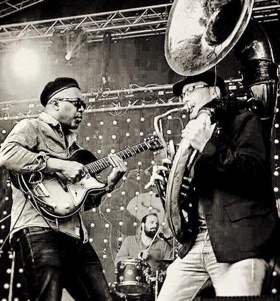Electrifying Creole Blues Band DELGRES Debut CD 'Mo Jodi' (Die Today) Out 8/31
By: Tori Hartshorn Aug. 22, 2018

The raw, muscular sound of the Paris-based roots trio Delgres connects the African history and culture of the French Caribbean, the Mississippi blues and New Orleans. Vividly captured in Mo Jodi (Die Today), the band's debut release, the music carries the richness, emotion and visceral power of a deeply personal story - and with good reason.
"It's as if everything I've done with my life until now led me to this moment," says singer, songwriter and guitarist Pascal Danaë, the founder and leader of Delgres (pron. del GRESS).
The trio is named after Louis Delgrès, a Creole officer in the French Army who died in Guadeloupe in 1802 fighting against Napoleon's army, which had been sent to reinstate slavery in the French Caribbean.
"The piece 'Mo Jodi' pays tribute to his sacrifice," explains Danaë. "As a result, the figure of Louis Delgrès was ever-present as the band slowly matured, to the extent that it seemed obvious it should take on his name."
Sung in Creole and English, Mo Jodi (to be released on August 31 on the PIAS label) conjures the spirit of the blues to not only speak up and celebrate, but also heal - all while calling on us to struggle against modern forms of oppression and slavery.
For Danaë these are not only human rights issues but deeply personal matters.
While his parents introduced him to the music of Guadeloupe growing up, it was not until Danaë was in his 30s that he finally went to the island. "My parents would never go back there on holiday," Danaë told Afropop Worldwide. "Everybody left Guadeloupe and never went back."
It was during his first trip to Guadeloupe that history became painfully personal after he found himself holding the letter of freedom given to his great-great-grandmother, dated 1841.
"When you read that piece of paper it says: 'Louise Danaë, 27 years old, and her four children' and they give you the names and ages. And my great-grandfather was one of those children. So you can really picture a very young lady and the little kids, 6, 3, and 1 year old. And then, you realize: 27 years of slavery." That 1-year-old was to become Pascal's great-grandfather.
That visit to Guadeloupe, his love of jazz and blues, and a gut connection to New Orleans and Louisiana -- a place where many Guadeloupeans sought refuge during both the slavery and post-slavery eras -- came together in his music organically.
|
|
|
Image: DELGRES (photo courtesy of the artist)
|
Comments

Videos

